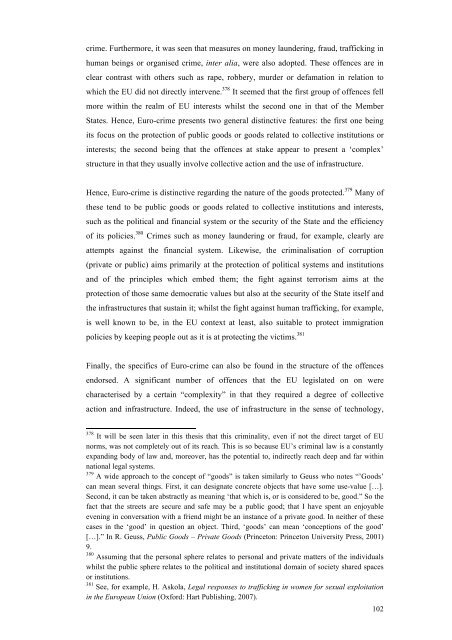The evolution of European Union criminal law (1957-2012)
The evolution of European Union criminal law (1957-2012)
The evolution of European Union criminal law (1957-2012)
Create successful ePaper yourself
Turn your PDF publications into a flip-book with our unique Google optimized e-Paper software.
crime. Furthermore, it was seen that measures on money laundering, fraud, trafficking in<br />
human beings or organised crime, inter alia, were also adopted. <strong>The</strong>se <strong>of</strong>fences are in<br />
clear contrast with others such as rape, robbery, murder or defamation in relation to<br />
which the EU did not directly intervene. 378 It seemed that the first group <strong>of</strong> <strong>of</strong>fences fell<br />
more within the realm <strong>of</strong> EU interests whilst the second one in that <strong>of</strong> the Member<br />
States. Hence, Euro-crime presents two general distinctive features: the first one being<br />
its focus on the protection <strong>of</strong> public goods or goods related to collective institutions or<br />
interests; the second being that the <strong>of</strong>fences at stake appear to present a ‘complex’<br />
structure in that they usually involve collective action and the use <strong>of</strong> infrastructure.<br />
Hence, Euro-crime is distinctive regarding the nature <strong>of</strong> the goods protected. 379 Many <strong>of</strong><br />
these tend to be public goods or goods related to collective institutions and interests,<br />
such as the political and financial system or the security <strong>of</strong> the State and the efficiency<br />
<strong>of</strong> its policies. 380 Crimes such as money laundering or fraud, for example, clearly are<br />
attempts against the financial system. Likewise, the <strong>criminal</strong>isation <strong>of</strong> corruption<br />
(private or public) aims primarily at the protection <strong>of</strong> political systems and institutions<br />
and <strong>of</strong> the principles which embed them; the fight against terrorism aims at the<br />
protection <strong>of</strong> those same democratic values but also at the security <strong>of</strong> the State itself and<br />
the infrastructures that sustain it; whilst the fight against human trafficking, for example,<br />
is well known to be, in the EU context at least, also suitable to protect immigration<br />
policies by keeping people out as it is at protecting the victims. 381<br />
Finally, the specifics <strong>of</strong> Euro-crime can also be found in the structure <strong>of</strong> the <strong>of</strong>fences<br />
endorsed. A significant number <strong>of</strong> <strong>of</strong>fences that the EU legislated on on were<br />
characterised by a certain “complexity” in that they required a degree <strong>of</strong> collective<br />
action and infrastructure. Indeed, the use <strong>of</strong> infrastructure in the sense <strong>of</strong> technology,<br />
378 It will be seen later in this thesis that this <strong>criminal</strong>ity, even if not the direct target <strong>of</strong> EU<br />
norms, was not completely out <strong>of</strong> its reach. This is so because EU’s <strong>criminal</strong> <strong>law</strong> is a constantly<br />
expanding body <strong>of</strong> <strong>law</strong> and, moreover, has the potential to, indirectly reach deep and far within<br />
national legal systems.<br />
379 A wide approach to the concept <strong>of</strong> “goods” is taken similarly to Geuss who notes “’Goods’<br />
can mean several things. First, it can designate concrete objects that have some use-value […].<br />
Second, it can be taken abstractly as meaning ‘that which is, or is considered to be, good.” So the<br />
fact that the streets are secure and safe may be a public good; that I have spent an enjoyable<br />
evening in conversation with a friend might be an instance <strong>of</strong> a private good. In neither <strong>of</strong> these<br />
cases in the ‘good’ in question an object. Third, ‘goods’ can mean ‘conceptions <strong>of</strong> the good’<br />
[…].” In R. Geuss, Public Goods – Private Goods (Princeton: Princeton University Press, 2001)<br />
9.<br />
380 Assuming that the personal sphere relates to personal and private matters <strong>of</strong> the individuals<br />
whilst the public sphere relates to the political and institutional domain <strong>of</strong> society shared spaces<br />
or institutions.<br />
381 See, for example, H. Askola, Legal responses to trafficking in women for sexual exploitation<br />
in the <strong>European</strong> <strong>Union</strong> (Oxford: Hart Publishing, 2007).<br />
102
















